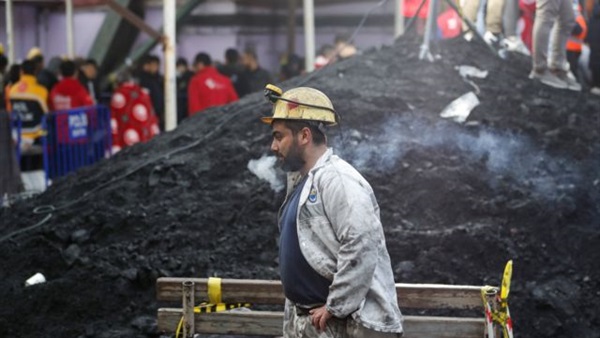Long, bleak wait for justice after young fathers die in Turkish mining blast

The stench of coal smoke hangs heavy over Amasra, a Turkish tourist resort on the Black Sea. Scattered through the green mountains that cradle the town are 41 new graves.
Most of the men who died in the explosion that ripped through Amasra’s coal mine ten days ago were in their twenties, and many were recently married with young children.
“He loved his work and he loved his family. He lived clean — may Allah accept him,” Ibrahim Mercan said of his son, Gokhan, 27, one of those who were killed. Gokhan had been married for three years, and was a father of two.
“At first we thought Gokhan had been rescued and we went to the hospital,” his father said. “Then we heard that he was among the dead. This will have a huge effect on the whole family. His children know who he is in photographs, and they can understand that something has happened to him. For them, we have to stay strong.”
This was the latest in a string of disasters in a country blighted by a rate of industrial accidents that far eclipses western Europe’s. Eight years ago, an explosion at the Soma mine in the Aegean region, in the west, killed 301 workers, making it Turkey’s deadliest mining accident. A total of 189 workers died down Turkish mines between 2019 and last year, compared with five in Germany over the same period.
A memorial in Amasra’s square lists dozens of men who have died in the mine since it opened in 1967. Last week, with 41 more names to be added, flower garlands had been arranged at its base. Initial reports suggest that the Amasra blast, which happened 300m below ground, at sunset on Friday, was caused by a build-up of methane gas that ignited. Investigators are looking into whether essential gas detection equipment was missing. The mine is operated by Turkish Hard Coal Enterprises, a state-owned company.
Omer Celik, father of Yasin, 22, who was killed, said: “For the past year he had been saying that there was a strange smell underground, and that the engineers had not been in to check it. It was disturbing him.”
Yasin, who took a job in the mine when he turned 18, had recently got engaged. His mother, Habibe, said: “It’s dangerous work but the wages are good. He grew up poor but when he started working there he was able to buy a car on credit. He really loved that car — he wanted a modern life.”
The Celik family say they have faith in the state’s investigators, but recent history suggests that the bereaved may wait a long time for answers. The Soma court cases ended in 2018, when four mine bosses were handed sentences of between 15 and 22 years. At the same time, several of the lawyers who had represented victims’ families were also prosecuted and imprisoned.
Dervis Aydin, who worked on the Soma case and is gathering information from Amasra, said that official investigations were conducted badly. “We realised that the maps in the Soma investigation were inaccurate, and that the managers had been allowed to go back in when they should have been banned from the site,” he said. “With the experience we gained there, we know that we have to work quickly to gather evidence. The companies know that there are deficiencies in the mines’ infrastructure. Despite that, they do not take any action.
“After Soma, some improvements were made in mining legislation but Amasra shows that nothing has changed in the management or infrastructure.”
In 2014, Soma led to nationwide protests against the handling of the disaster. Amasra, too, is becoming a lightning rod for anger at the government of President Erdogan, but many Turks have been dissuaded by the long jail sentences for those accused of co-ordinating protests against the government. Many active dissidents have fled the country.
A law passed the day before the Amasra blast has criminalised sharing “fake news”, as determined by the largely subjugated regulators and courts. As rescue operations continued at the mine on Saturday morning, police said that they had identified 12 social media users sharing “provocative” information under the law.
Erdogan, who faces an election next year, and two of his ministers flew to Amasra the day after the explosion and attended the funerals. As pro-government newspapers parroted official statements, opposition figures picked up on pictures of ministers smiling at a funeral, and criticised Erdogan for a speech in Amasra in which he said that “we are people who believe in fate”.
The Black Sea region, where Erdogan’s family are from, is largely conservative and support for his AK Party is high. Amasra itself, though, is a small support base of the CHP, the main secularist opposition party. Although the mine is close to the centre of the town, most miners come from the surrounding villages, poor places where choices for young men are limited.
There is no party in Turkey that stands up for the miners, said Ayse Yilmaz, an official with the Independent Mine Work Union set up by a retired miner after the Soma disaster. “Any reforms . . . are just theatre,” Yilmaz said. “Whatever penalties are levied for miners’ deaths, they are not enough to force them to make the mines safer.”
Turkish Hard Coal Enterprises did not respond to a request for comment.







